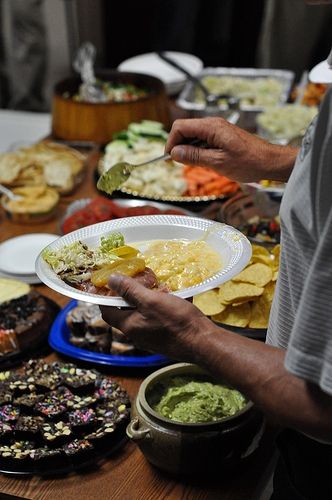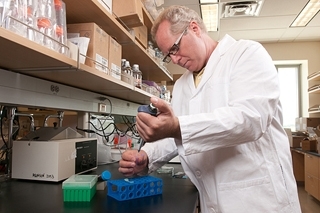Posts Tagged: listeria
Chicken salad recall put the spotlight on mysterious food pathogen, Listeria monocytogenes
The news this past week that nearly three tons of Trader Joe’s prepared barbeque chicken salad were recalled due to possible contamination by Listeria moncytogenes had me wondering anew about this mysterious foodborne pathogen. And today, seven tons of Garden Fresh prepared salads were also recalled.
I’ve spent precious minutes worrying about E. coli (ubiquitous, especially in poop) and Salmonella (the reason we must take care with raw eggs), but why doesn’t Listeria moncytogenes rank higher on my food-safety recognition meter?
A quick check of the U.S. Food and Drug Administration website showed that of 27 food recalls in July, 16 were related to Listeria monocytogenes. (One was linked to Staph bacteria, three to Salmonella and the rest to undeclared ingredients.)
Susan Algert, UC Cooperative Extension advisor in Santa Clara County, helped to fill me in. She is a nutrition, family and consumer sciences expert. Listeria monocytogenes is a ubiquitous soilborne bacteria found virtually everywhere.
The problem arises, Algert said, when the bacteria is spread by food handlers, farm equipment and food processing machines, then allowed to grow to levels that can cause illness.
“It can proliferate in the refrigerator if it’s not cold enough, under 40 °F,” Algert said, “and it will not be killed if food isn’t heated to over 140 °F.”

Safe food handling is key to preventing listeriosis, and all other foodborne illnesses, in people at greatest risk. This includes:
- Washing hands before preparing food.
- Thawing foods in the refrigerator — never at room temperature.
- Keeping foods cold (< 40 °F) or heating them thoroughly (> 140 °F).
- Disposing of perishable foods that have been left out for more than an hour.
“These measures are especially important at this time of year,” Algert said. “It’s warm. Dangerous bacteria in food will grow faster.”
(ANR has published guidelines for controlling Listeria monocytogenes in food packing operations.)
Algert noted that the symptoms of listeriosis can occur long after exposure, another reason why illnesses may not be linked to the bacteria.
“The incubation period is up to 70 days,” she said. “Many people get sick but don’t associate it with something they ate several weeks ago.”
While it was the chicken salad recall that hit the news, the recall actually involved all onions processed by Gill’s Onions of Oxnard, which supplies onions for processed salads and other foods. Other California products affected by the recall included Trader Joe’s salad dressings, butternut squash salad, and red quinoa and wheatberry salad. The Garden Fresh prepared salads also contained these onions.
The products were voluntarily recalled after FDA found Listeria monocytogenes in a random sample of diced yellow onions; the factory has been closed since July 17 pending an investigation. No illnesses have been linked to the possibly contaminated products.
“Gills Onions is committed to protecting public health and to executing this voluntary recall effectively and efficiently,” said Steve Gill, president of the company. “We are a multigenerational family business, and we work hard every day to earn the trust and confidence of customers and consumers who enjoy our high quality, healthy products.”
Anyone who has the recalled product should not consume it and destroy or discard it. Trader Joe’s said that it will provide full refunds.
La enfermedades causadas por alimentos contaminados y el Proyecto 100 K Genome

Bart Weimer, profesor de la Facultad de Veterinaria de UC Davis, funge como director del Proyecto 100,000 Genomas (100K Genome Project) y como co director de las recientemente establecidas instalaciones de BGI@UC Davis , donde se llevará a cabo la secuenciación. Otros colaboradores incluyen al los Centros para el Control y Prevención de Enfermedades de EUA (CDC )y el Departamento de Agricultura de EUA.
El nuevo proyecto de patógenos microbianos de cinco años se enfoca en hacer más seguro el suministro alimentario para los consumidores. El grupo elaborará una base de datos público y gratuito, incluyendo la información de secuencia para el genoma de cada patógeno — la colección completa de su información hereditaria. La base de datos contendrá los genomas de importantes patógenos de los alimentos incluyendo Salmonella, Listeria, y E. coli, así como los virus más comunes que contaminan alimentos y agua y causan enfermedades a las personas y animales.
El proyecto aportará el camino para el desarrollo de pruebas para identificar a los patógenos y ayudar a rastrear sus orígenes de manera más rápida. La nueva base de datos de genomas también permitirá a los científicos hacer descubrimientos que puedan ser usados para desarrollar nuevos métodos para el control de bacterias que causan enfermedades a través de la cadena alimentaria.
"Este histórico proyecto revolucionará nuestro entendimiento básico de estos microorganismos que causan enfermedades", dijo Harris Lewin, vice canciller de investigación en UC Davis.
El proyecto de secuencia es urgentemente importante para atacar los continuos brotes de enfermedades por alimentos contaminados que con frecuencia tienen resultados fatales alrededor del mundo. En los Estados Unidos solamente, enferman 48 millones de personas por intoxicación alimentaria anualmente y de las cuales mueren 3,000, según información de CDC.
"La falta de información sobre los genomas bacterianos relacionados con los alimentos está dificultando la habilidad de la comunidad investigativa para mejorar la seguridad del suministro alimentario mundial", señaló Weimer. "La información provista por el Proyecto 100,000 Genomas, permitirá que las pruebas de diagnostico sean más rápidas, más confiables, exactas y rentables".
"Vemos este proyecto como una forma de mejorar la calidad de vida para una gran parte de personas, a la vez que minimizamos un gran riesgo empresarial para productores y distribuidores de alimentos", manifestó Mike McMullen, presidente de Agilent’s Chemical Analysis Group.
Un artículo dirigido a los consumidores sobre el proyecto está disponible en sitio Web de la FDA .
(Este artículo es un condensado de un comunicado de prensa emitido por UC Davis. Lea el comunicado de prensa completo haciendo clic en press release y vea el video de Bart Weimer dando una visión general del proyecto).
Foodborne illnesses and the 100K Genome Project

Bart Weimer, professor in the UC Davis School of Veterinary Medicine, serves as director of the 100K Genome Project and co-director of the recently established BGI@UC Davis facility, where the sequencing will be done. Other collaborators include the U.S. Centers for Disease Control and Prevention and the U.S. Department of Agriculture.
The new five-year microbial pathogen project focuses on making the food supply safer for consumers. The group will build a free, public database including sequence information for each pathogen's genome — the complete collection of its hereditary information. The database will contain the genomes of important foodborne pathogens including Salmonella, Listeria, and E. coli, as well as the most common foodborne and waterborne viruses that sicken people and animals.
The project will provide a roadmap for developing tests to identify pathogens and help trace their origins more quickly. The new genome database also will enable scientists to make discoveries that can be used to develop new methods for controlling disease-causing bacteria in the food chain.
"This landmark project will revolutionize our basic understanding of these disease-causing microorganisms," said Harris Lewin, vice chancellor for research at UC Davis.
The sequencing project is critically important for tackling the continuing outbreaks of often-deadly foodborne diseases around the world. In the United States alone, foodborne diseases annually sicken 48 million people and kill 3,000, according to the CDC.
"The lack of information about food-related bacterial genomes is hindering the research community's ability to improve the safety and security of the world food supply," Weimer said. "The data provided by the 100K Genome Project will make diagnostic tests quicker, more reliable, more accurate and more cost-effective."
"We see this project as a way to improve quality of life for a great many people, while minimizing a major business risk for food producers and distributors," said Mike McMullen, president of Agilent’s Chemical Analysis Group.
A consumer-focused article about the project is available on the FDA website.
(This article was condensed from a UC Davis news release. Read the full press release and watch a video of Bart Weimer giving an overview of the project.)